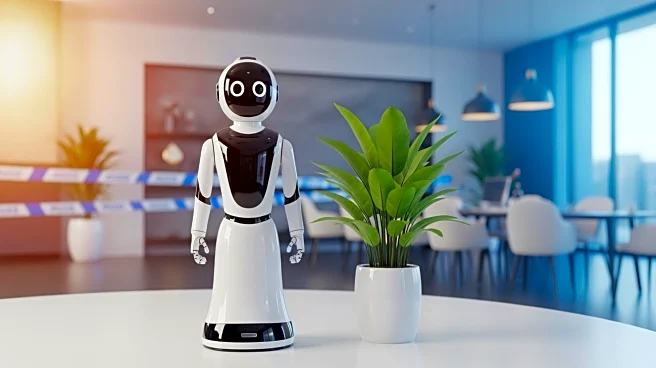What's Happening?
The hospitality industry is increasingly integrating Artificial Intelligence (AI) into human resources to optimize tasks and improve employee engagement. According to the Society of Human Resources Management
(SHRM), 40% of U.S. employers are already using AI in recruitment processes. AI is being utilized to handle mundane tasks, allowing HR professionals to focus on more strategic activities. The industry is adopting AI to enhance workplace efficiency, with guidelines suggesting that AI should be paired with human oversight to avoid errors and ensure a personal touch in employee interactions. AI tools are being used to gather insights, but human judgment remains crucial in decision-making processes.
Why It's Important?
The integration of AI in human resources is significant as it represents a shift towards more efficient and personalized employee management. By automating routine tasks, HR departments can focus on strategic initiatives that enhance employee satisfaction and retention. This technological advancement is crucial for the hospitality industry, which relies heavily on personal connections and customer service. The use of AI can lead to improved recruitment processes, better employee engagement, and a more dynamic workplace culture. However, it is essential to maintain human oversight to ensure AI tools do not introduce bias or errors, which could impact employee relations and company reputation.
What's Next?
As AI continues to evolve, the hospitality industry is expected to further integrate these tools into various HR functions. Companies may begin to audit AI systems for bias and ensure vendors are using AI appropriately. Transparency in AI usage will become increasingly important, with some state laws requiring disclosure of AI applications in the workplace. HR professionals will need to develop strategic prompts and maintain oversight to maximize the benefits of AI while safeguarding against potential risks. The industry will likely see a continued emphasis on balancing AI efficiency with human interaction to maintain the core values of hospitality.
Beyond the Headlines
The ethical implications of AI in HR are profound, as companies must navigate the balance between automation and personal connection. The potential for AI to introduce bias in decision-making processes necessitates careful monitoring and auditing. Additionally, the cultural impact of AI on workplace dynamics requires transparency and communication with employees about how AI is being used to support business objectives. As AI becomes more prevalent, companies will need to address these ethical and cultural dimensions to ensure responsible and effective use of technology.










